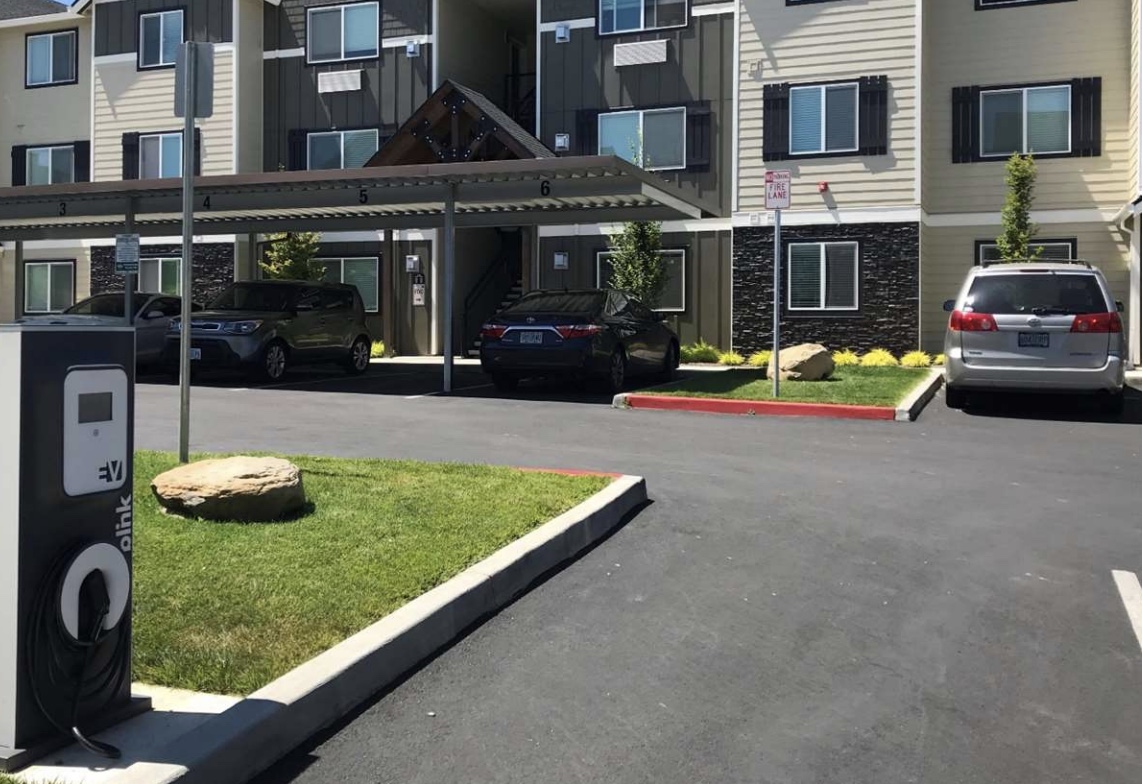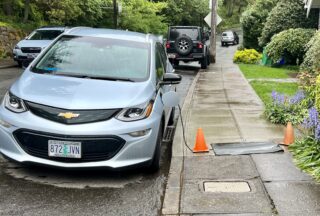
The City of Portland wants to make it easier for apartment and condo-dwellers to charge electric cars.
Thanks to Oregon’s House Bill 2180 that passed last year, it’s currently required statewide for new commercial, multi-dwelling and mixed-use buildings with more than five units to have electric car charging capacity in at least 20% of parking spaces.
The Portland Bureau of Planning and Sustainability (BPS) wants to kick that requirement up a notch with their Electric Vehicle (EV) Ready Code Project (EVRCP), a draft of which is now available for comment. The EVRCP would amend Portland city code to require new multi-unit dwellings to include electric car charging capacity for at least 50% of onsite parking spaces. If a multi-dwelling building has six or less parking spots, all of them will need to accommodate electric car charging.
State and local governments have honed in on expanding electric car use as a key way to reduce transportation-induced greenhouse gas emissions, which make up 43% of Oregon’s total.
Advertisement

(Photo: Jonathan Maus/BikePortland)
This code amendment clarifies the requirement will only apply to buildings with onsite parking, complementing a parking and land use reform rule currently being considered by the Oregon Land Development and Conservation Commission that would cut parking mandates in urban and suburban areas across the state as part of Oregon’s Climate-Friendly and Equitable Communities Rulemaking.
The proposed BPS amendment wouldn’t negate that parking reform bill. If newly constructed multi-dwelling and mixed use developments don’t want to include on-site parking at all, they don’t have to. But the parking spaces they do have need to support electric cars.
The new rules are also an attempt to balance the playing field between people who live in single-family, detached homes versus those who live in apartments, condos, and so on.
“Access to charging that is reliable, convenient, and affordable is critical to enabling EV ownership. Some sources estimate that more than 80% of charging occurs at home,” the Discussion Draft for the EVRCP states. “However, rental housing tenants often lack the ability to access or install a charger where they park at home due to a lack of dedicated off-street parking, an inability to afford the expense of charger installation, or a property owner’s unwillingness to install a charger.”
Advertisement
These rules are likely to heighten concerns by some active transportation activists that better electric car charging infrastructure should not leave out other EVs such as bicycles.
While statewide attention has mostly gone to electric car charging, the Oregon Department of Transportation has acknowledged the need to for micromobility charging as well – though it’s unclear how those needs will be met.
BPS’s draft document identifies the need to encourage using other modes of transportation, but it doesn’t mention anything about improving charging facilities for bicycle users:
Fundamentally, the number of private vehicles must decrease, the distance travelled must shrink, and alternative forms of electric transport (including electric buses, electric- scooters and electric bikes) must substitute for car trips. Making the city more attractive for walking and cycling is also an important strategy to reduce carbon from the transportation sector and to develop a low-carbon, resilient infrastructure system for Portland.
If you’d like to share feedback, use this online form until June 17. After comments are received, the city plans to release a proposal draft with a more specific implementation outline in August.

